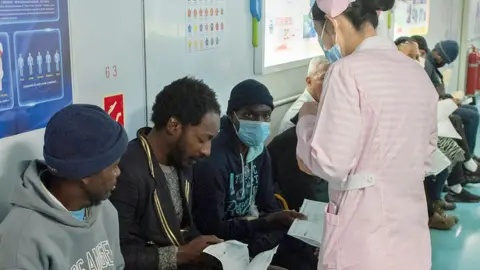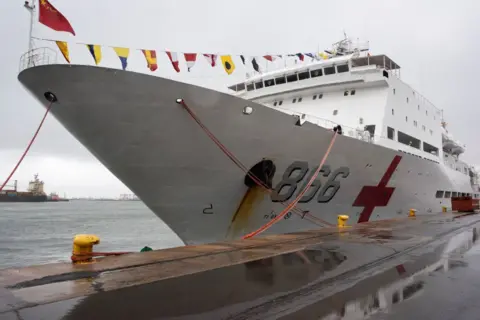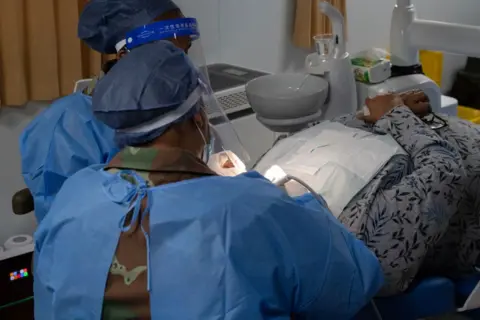 AFP
AFPBad winter weather, snow on Table Mountain and strong winds have not dampened the interest of Cape Town residents in the fact that free medical care is being offered on a Chinese ship, which is now docked in the South African city.
A financial crisis in one of Africa’s largest and most developed economies has left public services underfunded and many people say they cannot afford private healthcare due to rising prices.
It comes months after the government signed into law a controversial new healthcare system, which aims to provide universal health care for all, but faces threats of legal challenges.
Since China’s so-called peace ark arrived last week, more than 2,000 South Africans have been treated on board – from antenatal check-ups and cataract operations to cup therapy.
China has a strong political relationship with South Africa and this is Beijing’s latest display of soft power.
Lucy Mnyani told local media that she was happy to see pictures of her unborn child for the first time: “I had been to the day hospitals in Gugulethu and Langa [townships] and they never sent me for a CT scan.”
Another person queuing, Joseph Williams, told state broadcaster SABC: “When you go to the local clinic you sit for hours and hours before they help you, depending on your condition.
“The service here was very fast, so I’m grateful that I came. I actually got the results for what I put in.”
Officials say the ship can accommodate 700 patients each day and that the service is part of a joint exercise between the South African and Chinese militaries. The ship holds 100 people with 300 beds, 20 intensive care beds, operating rooms, clinical wards and even a rescue helicopter.
During the first two days of the Peace Ark, pre-selected people were offered treatment before it was made available to the public on Monday.
“We reached an agreement with the night shelters to provide services for people who live on the streets of Cape Town because they don’t have access to any health care,” Saadiq Kariem, head of the Western Cape’s health department, told the BBC.
He added that elderly people living in nursing homes had also been taken for medical care, and health care was being offered to health workers in the Western Hemisphere.
“From registration to completion of care took me an hour,” said Dr Kariem, who himself went to the doctor’s office and joined the queue as a civilian.
“This is something that would take much longer in our public health centers because there are many more people who need services.”
A total of 57 surgeries have been performed so far, a tiny dent in the province’s waiting list of 80,000 patients.
And this is in the Western Cape province, which arguably has one of the best healthcare systems in the country.
“These have mainly been orthopedic surgeries, cataracts and some fallopian tube surgeries for women who no longer want to get pregnant,” said Dr Kariem.
The popularity of the Ark of Peace is evident, said Dr Shuaib Manjra, chairman of the Health Justice Initiative: “It shows that the public health system in the province and in the country is not serving the people as it should be.”
“You often find that people spend a whole day in a clinic waiting to be seen. There is a lot of delay in hospitals, budgets and jobs are being cut, and it often leads to people missing up to two days of work after to have been waiting to be seen for a simple procedure,” he told the BBC.
 AFP
AFPThe African National Congress (ANC) says its National Health Insurance (NHI) scheme will be a major improvement as all services in both public and private facilities will be free at the point of care – paid from a central fund.
Health Minister Aaron Motsoaledi has insisted it will still be implemented despite the party losing its parliamentary majority in May and entering into a coalition government with parties such as the Democratic Alliance (DA) which oppose some aspects of the plan.
It will cause a major shake-up in the healthcare sector, but critics fear it could lead to an exodus of healthcare workers to find work abroad.
The arrangement is strongly opposed by private healthcare companies as it prohibits people from taking out private health insurance for treatment.
Currently, about 14% of the population has private medical care, while the remaining 86% rely on overburdened clinics and hospitals.
Last week, Business Unity South Africa and the South African Medical Association refused to sign what is known as the “health pact” – an annual agreement with the president that sets out how various sectors are to tackle health challenges in the coming year.
The two organizations – which between them represent private companies and 12,000 doctors – are angry at the NHI in its current form and feel it has been forced upon them.
Dr Manjra said the NHI was a “noble idea” but he understood the reservations.
“Our history of corruption and incompetence will potentially destroy the entire healthcare sector. It is estimated that in some cases up to a third of healthcare costs are lost to corruption.”
Addressing these issues within the public health sector should be a priority, he said.
 AFP
AFPSiphiwe Dlamini, a spokesperson for the South African military, told the BBC that the response to the peace ark had been overwhelming with good feedback about the “attention and care”.
The floating hospital leaves Cape Town on Thursday for Angola before continuing to several other countries. It has already visited the Seychelles, Tanzania, Madagascar and Mozambique – on its 10th tour since it was commissioned in 2008.
The initiative is seen as a further step in China’s efforts to expand its influence on the African continent.
Over the past two decades, its trade with Africa has grown steadily, but Beijing has also been increasingly involved in the construction sector – including building large sports stadiums in several parts of the continent.
More BBC news about South Africa:
 Getty Images/BBC
Getty Images/BBC#Ark #Peace #South #Africans #flock #Chinese #hospital #ship #Cape #Town
